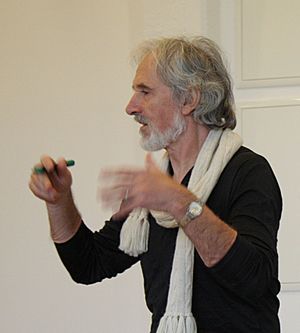Paolo Knill facts for kids
Paolo Knill (born June 11, 1932 – died September 13, 2020) was a Swiss scientist, artist, and therapist. He was a professor at Lesley University in Cambridge, Massachusetts. There, he helped start a special program for students to learn about Expressive Arts Therapy. In 1994, Knill also founded the European Graduate School in Saas-Fee, Switzerland.
Contents
Life and Education
Paolo Knill studied many different subjects. From 1953 to 1958, he studied musicology at the University of Zurich. At the same time, he also learned about how airplanes work and how structures are built at the Swiss Federal Institute of Technology.
Later, from 1959 to 1961, he studied how to help organizations and businesses at MIT. In 1976, he earned his doctorate degree in Psychology from Union Institute & University.
Teaching Career
Between 1970 and 1975, Knill taught at the Conservatory of Winterthur and Zurich. He also taught at Tufts University in Massachusetts.
From 1976 to 1995, Knill was a professor at Lesley University. He taught about counseling and Expressive Arts Therapies. He became a professor emeritus in 1996, which means he was honored for his long service. In 2001, he received an honorary doctorate in music from the Hochschule für Musik und Theater Hamburg.
Expressive Arts Therapy
Paolo Knill is known as one of the people who helped create the field of Expressive Arts Therapy. This type of therapy uses different art forms to help people. It started in the United States in the 1970s.
How Expressive Arts Therapy Works
Expressive Arts Therapy uses many kinds of art, like music, dance, drama, and visual arts. It helps people explore their feelings and solve problems. The idea is that art can help you understand yourself better.
Knill introduced a method called "intermodal decentering" in the 1990s. This method helps people get unstuck from their problems. It encourages them to use art in a playful way. This artistic play can help them find new solutions. These solutions often appear in the art they create.
He also developed a "theory of crystallization." This theory suggests that in art therapy, meaning comes from the art itself. The therapist and client connect through the art they are making.
Knill also talked about the "incommunicable third." This is a special moment in therapy when something new or unexpected happens. It's a breakthrough that wasn't planned.
Community Art
Knill also created a way to use Expressive Arts Therapy with large groups of people. He called this method "community art." It uses artistic activities to help whole communities work together and heal.
Institutions Founded by Knill
Besides his ideas, Knill also helped start several important places for Expressive Arts Therapy.
- He helped create the Expressive Arts Therapy program at Lesley University in the 1970s.
- In 1984, he founded the International School for Interdisciplinary Studies in Switzerland. This school has training centers in Canada, Denmark, Germany, and the United States. The Canadian branch is now called the CREATE Institute.
- In 1994, Knill founded the European Graduate School in Saas-Fee, Switzerland.
 | John T. Biggers |
 | Thomas Blackshear |
 | Mark Bradford |
 | Beverly Buchanan |


